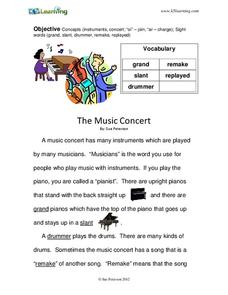K12 Reader
Waves & Currents
Challenge your young readers with a passage about physical science. After reading about sound waves and electric currents, kids answer five reading comprehension questions about what they have read.
K5 Learning
Why Does the Ocean have Waves?
Six short answer questions challenge scholars to show what they know after reading an informational text that examines waves—what they are, what causes them, and how different Earth factors affect their size and strength.
City College of San Francisco
Making Inferences: Reading Between the Lines
Have you ever read part of a story and had to figure out what the rest was about? Practice making inferences with several short passages and multiple choice questions.
K5 Learning
Grace Darling
Scholars read about a courageous young girl named Grace and her fearless act to save sailors at sea. Then, test their reading comprehension by way of four short answer questions.
K5 Learning
Space Based Astronomy
How much astronomy can you study with the naked eye? Learn more about the ways scientists explore the galaxy with a short reading passage and set of short-answer questions.
K12 Reader
What Causes Reflections?
Your kids probably use mirrors every day, but do they know how they work? A reading passage about reflection and reflective objects can address both physical science and reading comprehension. Kids read the paragraphs and use context...
K5 Learning
Fortune and the Beggar
Enhance reading comprehension strategies with a tale about a beggar's run in with a fortune. Scholars read, answer comprehension questions, and consider the moral of the story.
K5 Learning
A Ship in a Storm
Give reading comprehension a boost with a two-page activity featuring an informational text about ships at sea during stormy weather. After reading, scholars show what they know through four short-answer questions.
K12 Reader
They See with Their Ears
Sometimes bats get a bad rap, even though they are fascinating creatures! Teach your class about echolocation with a reading passage. After reading, class members respond to five questions based on the text.
E Reading Worksheets
Making Predictions #1
How can you tell what is going to happen next in a story? Learn to make predictions with five sections of stories. Kids read the beginning, and then write what they believe will happen next. Additionally, they provide evidence for their...
K12 Reader
Water Carves the Land
What affect do bodies of water have on the world around us? Kids can find out by reading this passage. After reading, they answer five questions related to the text.
K5 Learning
The Moon
Second graders read a short informational text passage about the moon and answer a series of questions based on what they read.
McGraw Hill
Study Guide for Island of the Blue Dolphins
Dive your class into a reading of Island of the Blue Dolphins with this in-depth study guide. Breaking the novel into three parts, the resource begins each section with a focus activity that identifies a specific theme or question to be...
Read Works
Famous Inventors Alexander Graham Bell: You Rang?
Scholars read a brief informational text about the famous inventor, Alexander Graham Bell and his invention of the telephone, then show what they know by way of eight questions—six multiple choice and two short answer.
E Reading Worksheets
Making Predictions #4
Show young readers how to use evidence from the text in an activity about making predictions. After reading five short passages, kids note what they think will happen next based on what they have read, and include the evidence that...
K5 Learning
The Music Concert
Second graders read an informational text passage on music concerts and then answer questions based on what they read.
Read Works
Trading Pumpkins
Can you imagine a pumpkin patch without pumpkins? Learners read how Tammy's family solves their problem in a cooperative way, followed by a set of 10 reading comprehension questions.
CPO Science
Physics Skill and Practice Worksheets
Stop wasting energy searching for physics resources, this comprehensive collection of worksheets has you covered. Starting with introductions to the scientific method, dimensional analysis, and graphing data, these skills practice...
Google
Adventure on the High Seas
Ahoy there! A fun computer science lesson challenges pupils to write a program that creates an ocean wave. They then develop stories to accompany their projects. All of this takes place within the Scratch coding program.
Houghton Mifflin Harcourt
Nature: Friend and Foe: English Language Development Lessons (Theme 6)
If readers don't understand key portions of a text, it may seem more like a foe than a friend. The second resource in a series of three ESL lessons designed to accompany the texts in Nature: Friend or Foe makes the texts easier to...
Tune Into English
Yellow Submarine – The Beatles – Notes
Enhance English language skills using the fan-favorite song, "Yellow Submarine" by The Beatles. Scholars predict what the song is about then listen and mark specific words they hear. Playing the song again, participants unscramble lyrics...






















